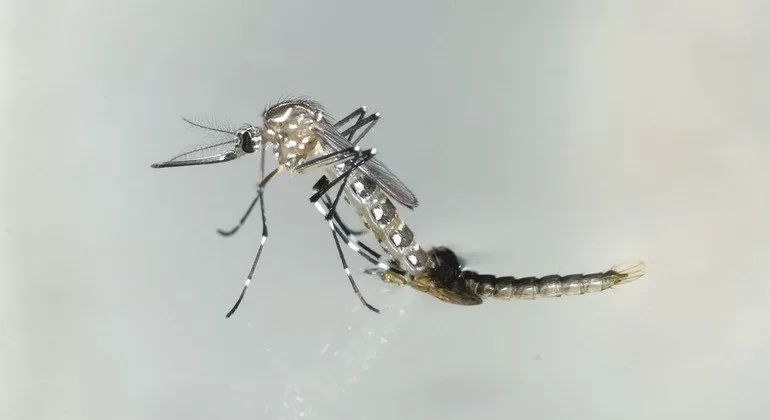Situation at a Glance
On 15 August 2023, a dengue outbreak was declared by the Ministry of Public Health and Prevention in Chad. As of 1 October, there have been 1 342 suspected cases, including 41 confirmed cases reported across eight health districts in four provinces. Among the confirmed cases, one death was reported. Abéché health district in Ouaddaï province, is the current epicentre of the outbreak. The Ministry of Public Health and Prevention has initiated a number of key response activities by implementing, in collaboration with WHO and partners, the national contingency plan for dengue preparedness and response. Dengue is a viral infection transmitted to humans through the bite of infected mosquitoes. Many dengue infections produce only mild flu-like illness and over 80% of cases are asymptomatic. There is no specific treatment for dengue; however, timely detection of cases and appropriate case management are key elements of care to prevent severity and fatality of dengue. This is the first dengue outbreak reported in Chad, and the country has limited surveillance, clinical and laboratory capabilities. Given the favorable environmental conditions for mosquito spread, an ongoing humanitarian crisis due to a massive influx of refugees and returnees from Sudan and limited response capacities, WHO assesses the risk posed by this outbreak as high at the national level.
Description of the Situation
On 15 August 2023, the Ministry of Public Health and Prevention of the Republic of Chad officially declared an outbreak of dengue in Abéché health district, Ouaddaï province, in the east of the country, representing the first dengue outbreak ever reported in Chad.
The declaration was made after the confirmation of dengue infection in eight out of 12 blood samples tested using real-time polymerase chain reaction (real-time PCR) at the national Biosafety and Epidemics Laboratory (LaBiEp) in N’Djamena. Subsequently, the samples were sent to the Institut Pasteur in Cameroon for confirmation, which was completed on 22 August by PCR and ELISA, confirming the presence of dengue.
As of 1 October, there have been 1 342 suspected cases, including 41 confirmed cases reported across eight health districts in four provinces. Among the confirmed cases, one death was reported (Case Fatality Ratio (CFR) among confirmed cases 2.4%).
The dengue serotype responsible for this outbreak remains unknown.
Eight districts in four provinces (NDjamena, Ouaddaï, Sila, and Wadi Fira) have reported confirmed dengue cases. Notably, Ouaddaï, the epicentre of the outbreak, has reported the highest number of confirmed cases, accounting for 31 out of the total 41 confirmed cases (76% of confirmed cases). The age group most affected by this outbreak are those between 15 to 34 years old, representing 27% of the reported confirmed cases.
Epidemiology
Dengue is a viral infection transmitted to humans through the bite of infected mosquitoes and is found in tropical and sub-tropical climates worldwide, mostly in urban and semi-urban areas. The primary vectors that transmit the disease are Aedes aegypti mosquitoes and, to a lesser extent, Aedes albopictus.
Dengue virus (DENV) has four serotypes (DENV-1, DENV-2, DENV-3, DENV-4). Infection with one serotype provides long-term immunity to the homologous serotype but not to the other serotypes; sequential infections with a different serotype put people at greater risk for severe dengue. Many DENV infections produce only mild flu-like illness and over 80% of cases are asymptomatic.
There is no specific treatment for dengue; however, the timely detection of cases, identifying any warning signs of severe dengue infection, and appropriate case management are key elements of care to lower the CFR during an outbreak to less than 1%.
Although Chad has previously experienced outbreaks of arboviruses such as chikungunya and yellow fever, this is the first dengue outbreak ever reported in the country. Chad, including the Ouaddaï province, experienced a chikungunya outbreak in 2020, with a total of 34 052 cases recorded and one associated death.
Public Health Response
The Ministry of Public Health and Prevention has initiated a number of key response activities, with the support of WHO and other partners, including:
- Mobilizing resources for the implementation of the national contingency plan for dengue preparedness and response, developed with WHO assistance.
- Strengthening surveillance and coordinating the response, including active case finding in healthcare facilities and the community and in-depth epidemiological investigations including regularly updating the case line list.
- Increasing early case detection capacity by disseminating community alert definition of cases and procuring rapid diagnostic tests (Bioline Dengue Duo (DENGUE NS1 Ag + IgG/IgM)) for health facilities.
- Ensuring effective logistics and operational support, including the transportation of samples for confirmation.
- Developing standard operating procedures (SOPs) for clinical management of suspected and confirmed dengue cases, including severe dengue and ensuring inventory of existing case management kits and address gaps.
- Strengthening cross-border collaboration and implementing prevention and vector control measures in border areas.
- Strengthening entomological surveillance, including aquatic and adult stages of the vectors, and characterizing vector bionomics.
- Implementing effective vector control measures as part of integrated vector management.
- Strengthening community mobilization and commitment to disseminate key information on transmission and control to the population.
WHO Risk Assessment
This is the first dengue outbreak reported in Chad, and the country lacks the necessary public health preparedness and response capacities.
Community cases are likely underreported because dengue is unknown to the general public and clinicians are not yet sensitised to its presentation, which is sometimes confused with those of other common febrile infections, making early diagnosis challenging, particularly in settings with lack of laboratory facilities for testing.
There is a high risk of spread due to the presence of mosquitoes in large, densely populated cities in eastern Chad near the Sudan border, with a tropical climate, and poor sanitation conditions suitable for mosquito development.
The province of Ouaddaï, which borders Sudan, is the epicentre of the outbreak and is also the province most affected by the ongoing humanitarian crisis due to a massive influx of refugees and returnees from Sudan. According to the United Nations High Commissioner for Refugees (UNHCR), the number of refugees in the Ouaddaï province is currently more than 400 000.
The movement of returning Sudanese refugees and Chadian nationals has the potential to spread the outbreak to new provinces and across the border.
Based on the information available for this event, WHO assesses the risk posed by this outbreak as high at the national level, moderate at regional level, and low at global level.
WHO Advice
The proximity of mosquito breeding sites to human habitation is a significant risk factor for dengue virus infection. The prevention and control of dengue depend on effective vector control. Vector control activities should focus on all areas where there is a risk of human-vector contact (place of residence, workplaces, schools, and hospitals). WHO promotes a strategic approach known as Integrated Vector Management (IVM) to control Aedes species, the vector of dengue. IVM should be enhanced to remove potential breeding sites, reduce vector populations, and minimize individual exposure. This should involve vector control strategies for larvae and adults (i.e. environmental management and source reduction), especially of water storage practices, and include covering, draining and cleaning household water storage containers on a weekly basis, applying larvicide in non-potable waters using WHO-prequalified larvicides at correct dosages, distribution of insecticide-treated nets (ITNs) for fever/dengue inpatients to contain spread of virus from health facilities, as well as strategies for protecting people and households. Indoor space spraying (fogging) is another approach for rapid containment of dengue-infected mosquitoes but may be challenging to deliver in densely populated areas of camps.
Personal protective measures during outdoor activities include topical application of repellents to exposed skin or treatment of clothing, and wearing long-sleeved shirts and pants. Indoor protection can include household insecticide aerosol products, or mosquito coils. Window and door screens can reduce the probability of mosquitoes entering the house. Insecticide-treated nets offer good protection against mosquito bites while sleeping during the day. Since Aedes mosquitoes (the primary vector for transmission) are active at dawn and dusk, personal protective measures are recommended, particularly at these times of day, both in residential areas and also at places of work and schools for children.
Entomological surveillance should be undertaken to assess the breeding potential of Aedes mosquitoes in containers and monitor insecticide resistance to help select the most effective insecticide-based interventions. There is no specific treatment for dengue infection, but early detection and access to appropriate healthcare for case management can reduce mortality. Case surveillance should continue to be enhanced in all affected areas and nationwide. Where feasible, resources should be allocated to strengthen a sample referral mechanism for the confirmation and sub-typing of the dengue virus.
Communities play a major role in the success and sustainability of vector control activities. While coordination among many stakeholders is required, vector control is critically dependent on ensuring that communities are aware of the risk of infection and know which measures to take to protect themselves. Community engagement and mobilization involve working with local residents to improve vector control and build resilience against future disease outbreaks. Where appropriate participatory community-based approaches are in place, communities are supported to take responsibility for and implement vector control. Participatory community-based approaches aim to ensure that healthy behaviours become part of the social fabric and that communities take ownership of vector control at both inside and outside households.
Based on the information available for this event, WHO does not recommend travel or trade restrictions be applied to Chad.
Further Information
Citable reference: World Health Organization (16 October 2023). Disease Outbreak News; Dengue – Chad. Available at: https://www.who.int/emergencies/disease-outbreak-news/item/2023-DON491












